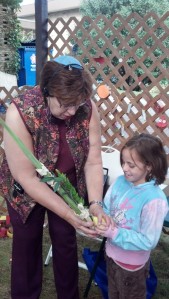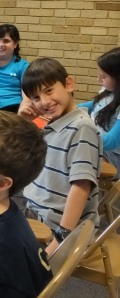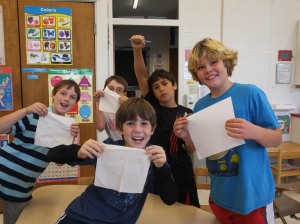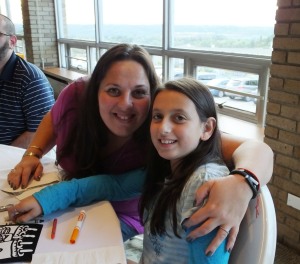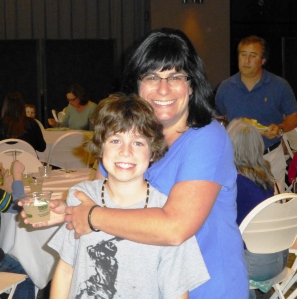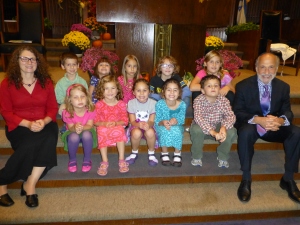2 Minutes of Torah Study — D’varim
Miss Torah Study this morning? Get caught up in two minutes or less and join us in the WRJ room at 9:00am Shabbat mornings!
When we recount events, when we retell stories, we tend to do so with an agenda. Sometimes it’s about embellishment to make ourselves look better, tougher, or more virtuous: perhaps that’s how the caught fish grows from 10 to 15 to 25 inches and the walk turns out to be uphill in both directions. More often than not, however, we recount events through the lens of our interpretations, impressing upon the listener what we believe to be important…even if that differs from the full story.
In this week’s Torah portion, D’varim, Moses takes similar liberties. A compassion between the ordeal of the spies sent to scout the land in Numbers 13 and Deuteronomy 1 shows significant differences:
In Numbers, God sent the Tribal leaders; in Deuteronomy, Moses sent 12 unspecified people.
In Numbers, the spies were scouting the whole land to determine its worth; in Deuteronomy, they are merely looking for an expedient path.
In Numbers, the spies brought back considerable warning about the Nephalim, the giants living in the land; in Deuteronomy, they simply reported that the land was good.
Why the discrepancies?
According to Nehama Leibowitz, Moses tried to show the people that: “Every individual is responsible for the misdeeds of the group. Each one is obligated to resist evil and do good, and not excuse himself on the ground that he was influenced by his colleague or superior or leader. Each individual has ultimately to be his own leader, responsible for his every action.”
May our study of Deuteronomy ensure that we never forget this lesson.
2 Minutes of Torah Study — Matot-Masei
The Daughters of Zelophechad: Mahlah, Noah, Hoglah, Milkah, and Tirzah. So wise and righteous as to bring merit to their ancestors, says B’midbar Rabbah. Strong, empowered women who joined together to protest an unjust social order, writes Vanessa Ochs, professor at UVA. More righteous than the men of their generation we read elsewhere in B’midbar Rabbah. Able to affect durable, dramatic change.
Well, not so fast.
The empowered story we read in Parashat Pinchas is tempered by the end of this week’s double portion, Matot-Masei. The male leaders of Zelophechad’s daughters’ family clan point out that the geographic area of their landholdings will be diminished if the women marry outside the tribe. Moses recognizes this as just, and changes what was to be a law for all time. Yes, Mahlah, Noah, Hoglah, Milkah, and Tirzah can rightfully inherit, and they can even marry whomever they please — so long as it pleased them to marry their cousins.
In the words of Rabbi Amber Powers in Torah Queeries, interpreting Torah through a so-called “bent lens:”
“The fight for justice and equality is ongoing and not a linear path… Like the heads of the family clan in this Torah portion, there may be times when we personally stand in a place of privilege and we would risk losing something if we supported another’s fight for change. Like the daughters of Zelophekhad, there are times when we will submit to a less than fully just solution as a compromise, a temporary measure, or because we have no choice. Nevertheless, we must remain clear about our visions of justice and equality and continue to work for their fullest expression in our communities and our practices.”
2 Minutes of Torah Study – Parashat Pinchas
Sometime around the year 500CE, a new type of scholar arose who assumed responsibility for preserving, homogenizing, and transmitting the biblical text. Known as the Masorites — either from the Hebrew for “to bind” or “to hand down” — it was these scribes who added the vowels and trope marks to the text we have today. They also systematized the writing of Torah, including the “mistake” we see in Parashat Pinchas.
Notice the broken vav in the word shalom.
God promises Pinchas, a zealot who took it upon himself to mete out justice upon idolators, His “brit shalom” or “covenant of peace.” Scholars throughout time have struggled with this text, noting that ours is not a tradition where we believe the ends justify the means. The Jerusalem Talmud reports that Pinchas acted against the will of the wise men: “Rabbi Yuda said: ‘They desired to excommunicate him.’” The Kotzker Rebbe taught that it was this action that prevented him from being Moses’ successor. And the Masorites go as far as to break the vav, perhaps symbolizing either a broken trust or a broken man.
Rabbi Jacob ben Asher, the B’al HaTurim goes futher. The broken vav is our clue that Pinchas is actually Eliyahu Hanavi, Elijah the prophet. They both acted zealously for God, and Eliyahu can be spelled with or without the vav (note the difference between 1 and 2 Kings). Who else can be spelled with or without a vav? Jacob the patriarch, as we see in Leviticus 26. According to B’a HaTurim, Jacob required Elijah’s vav as a security deposit until such time as he hearlds the coming of the messiah in fulfillment of God’s promise. When that happens, and only then, Elijah — Pinchas — can have his vav back.
Jacob the trickster knew better than to trust a zealot. Neither should we.
A Time of Rejoicing
Sukkot is known as Z’man Simchateinu…a Time of Rejoicing…and indeed it was! Everyone had a great time visiting our outdoor sukkah – thank you to Ms. Freed for making it an awesome experience!
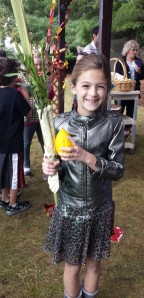
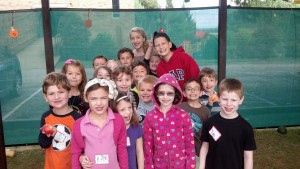
Our younger students also visited Mrs. Altschul in the Library… and had story time in a very special sukkah:

The smiles and laughter continued all week:

And then to end it all… our rousing celebration of Simchat Torah! It started with a delicious spaghetti dinner. And then, amid much dancing and singing, we read the end of Deuteronomy, rolled the Torah all the way to the beginning and started over with the first verses of Genesis and the Creation story. We also welcomed our newest students to the Torah Center:

What a week!
* * *
A big THANK YOU to Jason Richards for contributing so many great pictures to this week’s blog entry!
* * *
Coming Up:
~ Our first Shabbat LaMishpacha Dinner and Family service of the year is THIS Friday, October 4th! Please let Lori in the main office know if you are able to attend the dinner. The cost is $15 for adults, $5.50 for children under 14. Can’t make it to the dinner? Join us for the service. This is a “don’t miss” event! See you there!
~ 4th Grade Family Day is THIS Sunday, October 6th from 9:50 am – 11:30 at SHIM. If you have not done so already, please RSVP to Rachel or Paula at [email protected].
~ There will be NO JHS CLASSES THIS Monday, October 7th.


